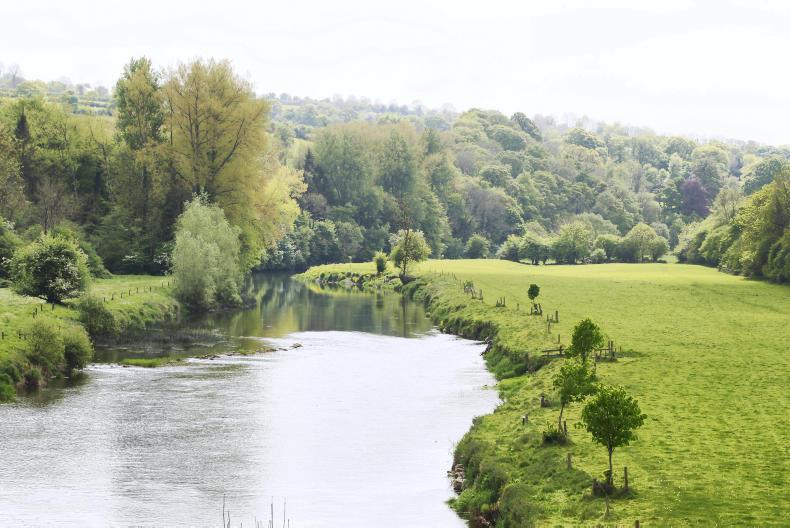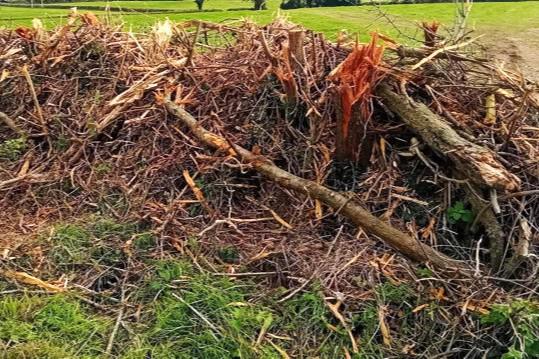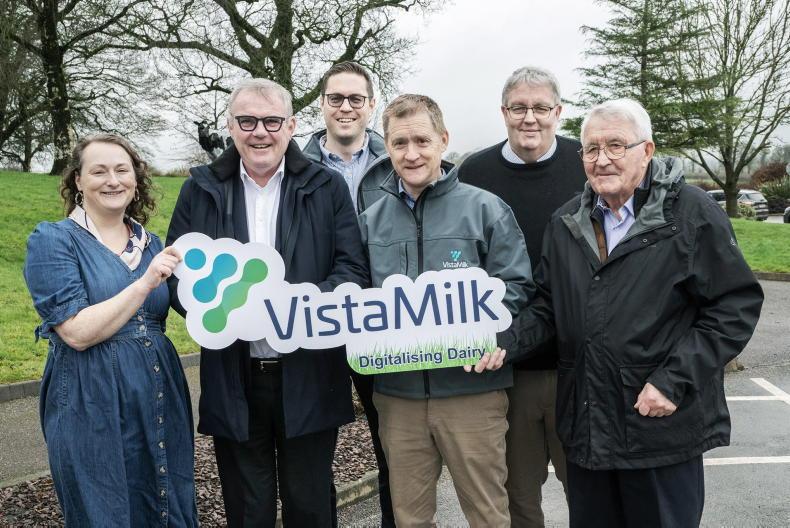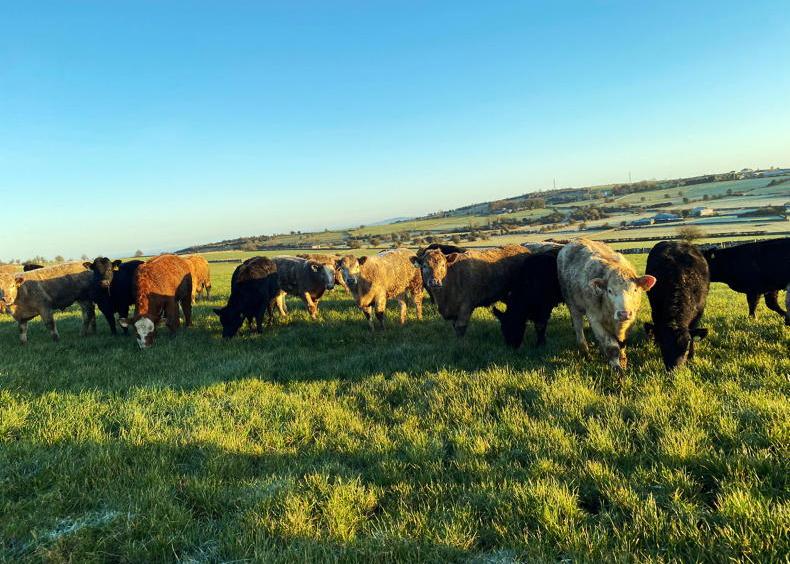After the most recent review of Ireland’s nitrates derogation, new measures were introduced. These new measures are aimed at protecting both water quality and the nitrates derogation.
The derogation is seen as being strategically important for the livestock sector, but particularly for dairy farmers. It allows farmers to stock their farm higher than 170kg of organic nitrogen per hectare per year.
As things currently stand, one dairy cow produces 85kg of organic nitrogen per year, so without a derogation the maximum stocking rate is two cows or two livestock units per hectare. With the derogation to 250kg organic N/ha, farms can be stocked at 2.94 cows/ha.
If a derogation wasn’t available, having to reduce stock numbers to two cows/ha would make many farms unviable
However, in a review of farmers who applied for a derogation in 2018, the average stocking rate was 2.49 livestock units per hectare, or one cow per acre in old money. This tallies with what would be considered close to an optimum stocking rate on most well-run farms.
If a derogation wasn’t available, having to reduce stock numbers to two cows/ha would make many farms unviable. Therefore, protecting the derogation is hugely important for Irish agriculture. The Department of Agriculture has stated that the best way to protect the derogation is to protect water quality. As recent reports indicate, water quality in Ireland is declining. If this trend continues, we can expect to see further pressure on the nitrates derogation.
Changes
Changes to the derogation rules were introduced in 2019 and further rule changes have been introduced for 2020 and beyond. Probably the biggest change for 2020 is the fact that the net has been made bigger. Approximately 7,000 farmers applied for a derogation in 2019, but there are approximately 5,000 more farmers who operate a stocking rate above 170kg organic N/ha but who avoid applying for a derogation by exporting slurry. From now on, all farms above 170kg organic N/ha will have to comply with most environmental rules, whether they are in a derogation or not. Other changes for 2020 are outlined here.
Slurry
All slurry spread after 15 April 2020 on derogation farms must be spread with low-emission slurry spreading (LESS) equipment such as trailing shoe, dribble bar or injectors. All slurry must be spread with low-emission equipment in 2021. Soiled water can still be spread using a splash plate. These slurry rules apply to farmers in derogation or above 170kg organic N/ha.
Exports
Currently, records of slurry exports can be submitted at year end. In 2020, the deadline for receipt of slurry movement forms will be brought forward to end of October. Both the farmer exporting the slurry and the farmer receiving the slurry are likely to have to “opt-in” using text messaging or other form of communication.
Grass management
In 2020, all derogation farmers will have to either undertake grass measuring and budgeting through a software programme (such as PastureBase) or undertake certified grassland management training in either 2020 or 2021. It is not yet known what the minimum requirements will be for grass measuring and budgeting, but it is expected to be in the order of at least 20 grass walks completed, spread throughout the growing season.
Lime
From 2020, all farmers above 170kg organic N/ha will have to participate in a compulsory liming programme. How much lime to spread will be determined by soil samples and application rates will have to be front-loaded. This measure is aimed at improving nutrient use efficiency. It is not yet clear how this policy will be implemented but evidence of lime purchases are likely to be required.
Land eligibility
Rough grazing or commonage will no longer be considered eligible land under a nitrates derogation. The area under rough grazing or commonage will not be included in the calculation for chemical fertiliser allowance. This applies to derogation farmers from 2020.
Crude protein
From 2020, farmers with more than 170kg organic N/ha will have to reduce the amount of crude protein in animal feeds when cattle are grazing. This measure is aimed at reducing the nitrate concentration in urine which results when excess crude protein is fed in the diet. It is not yet clear how this policy will be implemented.
Clover
Clover must be sown when reseeding is carried out by derogation farmers.
Phosphorus
The Nitrates Directive also governs the use of phosphorus. Farmers on organic (peat) soils are limited in the amount of phosphorus that they can apply. Effectively, all soils with more than 20% peat are classified as being soil index three for phosphorus, meaning only maintenance rates of chemical phosphorus are allowed. This is because peat soils are not able to retain phosphorus so there is a higher risk of run-off. The Department of Agriculture has a map detailing the parts of the country that have high peat levels. This map is available on an individual farm and field basis. If the soil type in a field is contested, the map can be updated based on soil sample results or if an advisor signs off that the field is less than 20% peat.
Biodiversity
Derogation farms must adopt one of the biodiversity measures in the All Ireland Pollinator Plan in 2020.
Water quality
By 2021, farmers in a derogation or those that are stocked higher than 170kg organic N/ha will have to adopt extra measures to prevent contamination of waterways. Water troughs must be more than 20m away from watercourses and animals must be prevented from entering watercourses to drink water.
All watercourses must be fenced back 1.5m from the top of the bank. Furthermore, roadways adjacent to watercourses must be cambered away from the watercourse.
A specification on this is to be published by the Department of Agriculture. Watercourses are defined as anything that can carry water, even a dry drain.
Read more
Leaving space for someone else’s dream
Dairy management: what to look for in dry cow minerals
After the most recent review of Ireland’s nitrates derogation, new measures were introduced. These new measures are aimed at protecting both water quality and the nitrates derogation.
The derogation is seen as being strategically important for the livestock sector, but particularly for dairy farmers. It allows farmers to stock their farm higher than 170kg of organic nitrogen per hectare per year.
As things currently stand, one dairy cow produces 85kg of organic nitrogen per year, so without a derogation the maximum stocking rate is two cows or two livestock units per hectare. With the derogation to 250kg organic N/ha, farms can be stocked at 2.94 cows/ha.
If a derogation wasn’t available, having to reduce stock numbers to two cows/ha would make many farms unviable
However, in a review of farmers who applied for a derogation in 2018, the average stocking rate was 2.49 livestock units per hectare, or one cow per acre in old money. This tallies with what would be considered close to an optimum stocking rate on most well-run farms.
If a derogation wasn’t available, having to reduce stock numbers to two cows/ha would make many farms unviable. Therefore, protecting the derogation is hugely important for Irish agriculture. The Department of Agriculture has stated that the best way to protect the derogation is to protect water quality. As recent reports indicate, water quality in Ireland is declining. If this trend continues, we can expect to see further pressure on the nitrates derogation.
Changes
Changes to the derogation rules were introduced in 2019 and further rule changes have been introduced for 2020 and beyond. Probably the biggest change for 2020 is the fact that the net has been made bigger. Approximately 7,000 farmers applied for a derogation in 2019, but there are approximately 5,000 more farmers who operate a stocking rate above 170kg organic N/ha but who avoid applying for a derogation by exporting slurry. From now on, all farms above 170kg organic N/ha will have to comply with most environmental rules, whether they are in a derogation or not. Other changes for 2020 are outlined here.
Slurry
All slurry spread after 15 April 2020 on derogation farms must be spread with low-emission slurry spreading (LESS) equipment such as trailing shoe, dribble bar or injectors. All slurry must be spread with low-emission equipment in 2021. Soiled water can still be spread using a splash plate. These slurry rules apply to farmers in derogation or above 170kg organic N/ha.
Exports
Currently, records of slurry exports can be submitted at year end. In 2020, the deadline for receipt of slurry movement forms will be brought forward to end of October. Both the farmer exporting the slurry and the farmer receiving the slurry are likely to have to “opt-in” using text messaging or other form of communication.
Grass management
In 2020, all derogation farmers will have to either undertake grass measuring and budgeting through a software programme (such as PastureBase) or undertake certified grassland management training in either 2020 or 2021. It is not yet known what the minimum requirements will be for grass measuring and budgeting, but it is expected to be in the order of at least 20 grass walks completed, spread throughout the growing season.
Lime
From 2020, all farmers above 170kg organic N/ha will have to participate in a compulsory liming programme. How much lime to spread will be determined by soil samples and application rates will have to be front-loaded. This measure is aimed at improving nutrient use efficiency. It is not yet clear how this policy will be implemented but evidence of lime purchases are likely to be required.
Land eligibility
Rough grazing or commonage will no longer be considered eligible land under a nitrates derogation. The area under rough grazing or commonage will not be included in the calculation for chemical fertiliser allowance. This applies to derogation farmers from 2020.
Crude protein
From 2020, farmers with more than 170kg organic N/ha will have to reduce the amount of crude protein in animal feeds when cattle are grazing. This measure is aimed at reducing the nitrate concentration in urine which results when excess crude protein is fed in the diet. It is not yet clear how this policy will be implemented.
Clover
Clover must be sown when reseeding is carried out by derogation farmers.
Phosphorus
The Nitrates Directive also governs the use of phosphorus. Farmers on organic (peat) soils are limited in the amount of phosphorus that they can apply. Effectively, all soils with more than 20% peat are classified as being soil index three for phosphorus, meaning only maintenance rates of chemical phosphorus are allowed. This is because peat soils are not able to retain phosphorus so there is a higher risk of run-off. The Department of Agriculture has a map detailing the parts of the country that have high peat levels. This map is available on an individual farm and field basis. If the soil type in a field is contested, the map can be updated based on soil sample results or if an advisor signs off that the field is less than 20% peat.
Biodiversity
Derogation farms must adopt one of the biodiversity measures in the All Ireland Pollinator Plan in 2020.
Water quality
By 2021, farmers in a derogation or those that are stocked higher than 170kg organic N/ha will have to adopt extra measures to prevent contamination of waterways. Water troughs must be more than 20m away from watercourses and animals must be prevented from entering watercourses to drink water.
All watercourses must be fenced back 1.5m from the top of the bank. Furthermore, roadways adjacent to watercourses must be cambered away from the watercourse.
A specification on this is to be published by the Department of Agriculture. Watercourses are defined as anything that can carry water, even a dry drain.
Read more
Leaving space for someone else’s dream
Dairy management: what to look for in dry cow minerals










SHARING OPTIONS